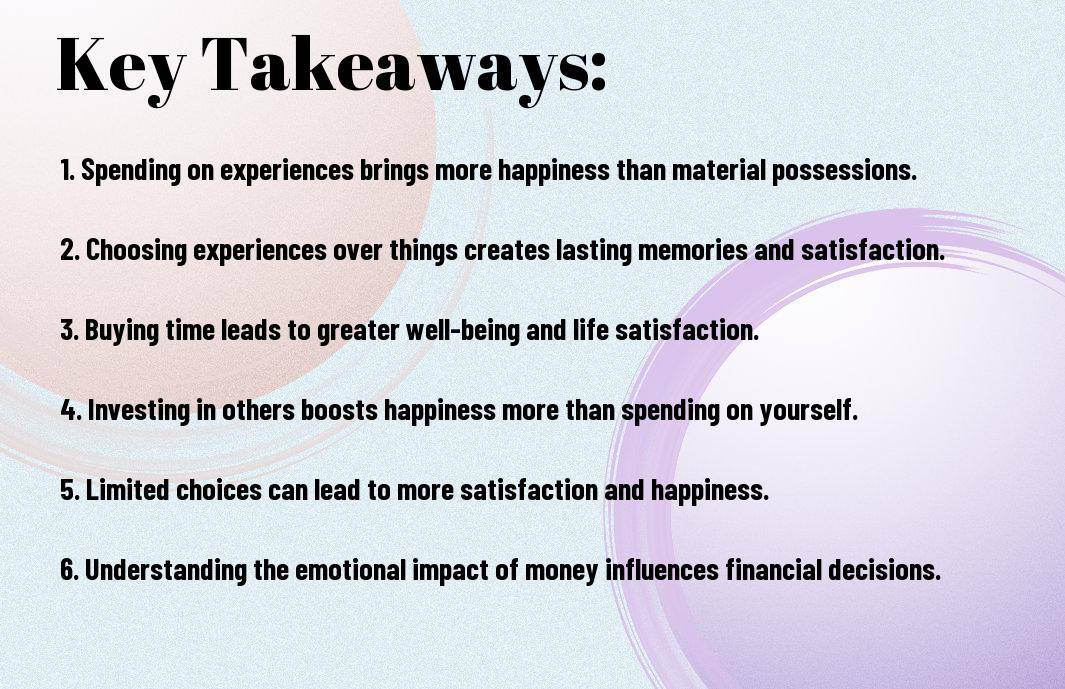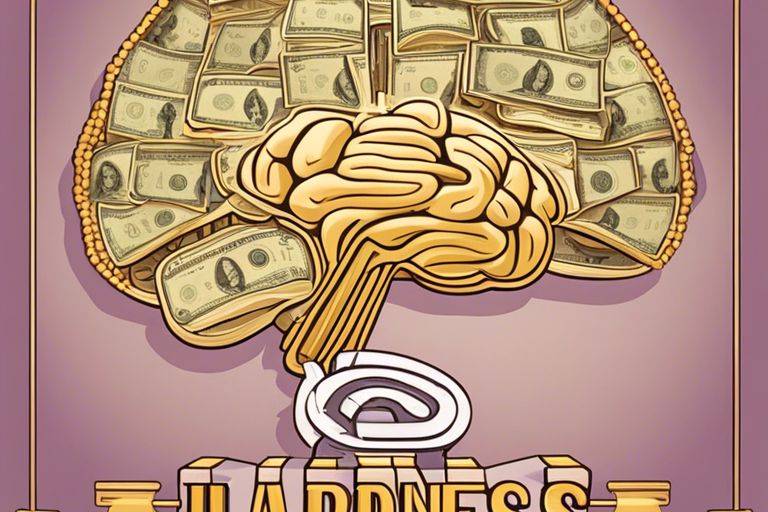The Psychology of Happy Money! You know that feeling when you splurge on something and it instantly lifts your mood? Or when you see your savings account growing and it gives you a sense of accomplishment? Our relationship with money goes beyond just numbers and transactions – it’s intertwined with our emotions and behaviors. In this blog post, we will explore the psychology of happy money and how understanding your financial behavior can lead to better financial decisions and ultimately a happier life. Let’s look into the complex world of money and emotions together!
Key Takeaways:
- Spending on experiences over material possessions: Investing in memorable experiences such as travel or events can lead to longer-lasting happiness than buying material goods.
- Automating your savings: Setting up automatic transfers to your savings account can help you build wealth without relying on willpower or decision-making.
- Understanding your emotional relationship with money: Recognizing your emotions and triggers around money can help you make more mindful financial decisions and avoid impulse spending.

The Roots of Financial Happiness
The Psychology of Money: Timeless lessons on wealth, happiness, and psychological freedom investigates into the intricate relationship between our mindset and our finances. Understanding the roots of financial happiness can unlock a world of contentment and satisfaction in our lives.
What is Happy Money?
To truly comprehend the concept of happy money, we must first recognize that not all money is created equal. Happy money is the kind of money that is spent in ways that bring joy not only in the moment but also in the long run. It’s about investing in experiences, relationships, and personal growth rather than material possessions. Happy money is a tool that can be leveraged to enhance our well-being and overall happiness.
To understand the roots of financial happiness, it’s crucial to explore the science behind spending and satisfaction. Studies have shown that the way we allocate our financial resources has a direct impact on our emotional well-being. When we spend money on experiences and activities that align with our values and interests, we tend to derive greater satisfaction and fulfillment. This correlation between spending and satisfaction sheds light on the importance of mindful financial decision-making in cultivating a truly happy life.
The Science Behind Spending and Satisfaction
Happy money is not just about the amount we spend but also about how we spend it. Research in positive psychology has highlighted the significance of intentional spending in promoting lasting happiness. By directing our financial resources towards experiences that foster personal growth, meaningful connections, and positive emotions, we can create a more fulfilling and satisfying life. Understanding the science behind spending and satisfaction empowers us to make informed choices that align with our values and aspirations, ultimately leading to greater well-being and contentment.
Spending Wisely
Despite the common belief that money can’t buy happiness, research shows that how we spend our money plays a significant role in our overall well-being. The key is not how much money we have, but how we choose to spend it. By understanding the psychology behind our financial behavior, we can make more intentional choices that lead to greater satisfaction and happiness.
Experience Over Objects: Where to Put Your Dollars
Wisely investing in experiences over material possessions can lead to greater long-term happiness. Studies have shown that memories of experiences tend to bring more joy and fulfillment than the fleeting happiness derived from buying things. So next time you’re debating between a new gadget or a weekend getaway, consider opting for the experience that can create lasting memories and positive emotions.
Research also suggests that experiential purchases contribute more to our sense of identity and connection with others, leading to a deeper sense of fulfillment. So whether it’s traveling to a new destination, taking up a new hobby, or attending a concert with friends, prioritize spending on experiences that enrich your life and foster relationships.
Giving Back: How Altruism Affects Your Wallet
One of the most rewarding ways to spend your money is by giving back to others. Engaging in acts of kindness and generosity not only benefits the recipient but also has a positive impact on your own well-being. Research has shown that altruistic behavior activates the brain’s reward centers, leading to increased feelings of happiness and fulfillment.
Your financial well-being is not just about accumulating wealth but also about how you use that wealth to make a positive difference in the lives of others. Whether it’s donating to a cause you care about, volunteering your time, or simply lending a helping hand to someone in need, practicing generosity can bring immense joy and satisfaction. Start incorporating acts of kindness into your financial habits and watch how it transforms your relationship with money and your overall happiness.
Saving with a Smile
For those interested in delving deeper into the fascinating world of financial psychology, The Psychology of Money – Harriman House is an excellent resource. Understanding how our minds work in relation to money can help us make smarter financial decisions and lead to a more fulfilling life.
Setting Goals for Financial Contentment
Goals play a crucial role in shaping our financial behavior. Whether it’s saving for a dream vacation, a down payment on a house, or retirement, setting clear and achievable goals can provide direction and motivation in our financial journey. By breaking down big goals into smaller milestones, we can celebrate our progress along the way, reinforcing positive saving habits.
Mindfulness and Money: The Art of Appreciative Saving
For individuals seeking a more mindful approach to managing their finances, the concept of appreciative saving can be transformative. By practicing gratitude for what we already have and being present in our spending decisions, we can cultivate a positive relationship with money. This mindful awareness can help us distinguish between our needs and wants, leading to more intentional and fulfilling purchases.
For instance, taking a moment to appreciate the value that a purchase adds to our lives can shift our focus from mere consumption to conscious spending. Mindfulness can also help us resist impulsive buys and find joy in saving for meaningful goals. Incorporating mindfulness into our financial habits can ultimately lead to a greater sense of financial well-being and contentment in the long run.
Overcoming Financial Stress
Once again, financial stress is a common issue that many people face. It can lead to sleepless nights, strained relationships, and a general feeling of unease. The good news is that there are strategies you can use to overcome financial stress and improve your overall well-being.
Identifying and Tackling Money Anxiety
Anxiety around money can stem from various sources such as debt, job insecurity, or even societal pressures to keep up with others. The first step in tackling money anxiety is to identify its root cause. Take some time to reflect on what specifically is causing you stress when it comes to finances. Once you pinpoint the source, you can start formulating a plan to address it.
Building a Positive Money Mindset
Positive money mindset is crucial in overcoming financial stress. This involves reframing your thoughts and beliefs about money. Instead of viewing money as a source of anxiety, try to see it as a tool that can help you achieve your goals and live a fulfilling life. Practice gratitude for what you have, set realistic financial goals, and celebrate small victories along the way.
Overcoming negative money mindset is a journey, but with dedication and persistence, you can change your relationship with money for the better. Surround yourself with positive influences, whether through books, podcasts, or like-minded individuals who can offer support and encouragement along the way.
Financial Behavior and Relationships
Your The Psychology of Money: Understanding Your Financial … behavior is closely intertwined with your personal relationships. How you communicate about money and make shared financial decisions with your partner or family can significantly impact your financial well-being and happiness.
Communicating about Money in Personal Relationships
On the journey towards financial harmony, effective communication about money is key. Whether discussing budgets, expenses, or financial goals, open and honest conversations can help build trust and understanding between partners. It’s crucial to create a safe space where both parties feel comfortable expressing their views and concerns regarding finances.
Influencing Factors on Shared Financial Decisions
Influencing factors such as values, beliefs, and past experiences play a crucial role in shaping shared financial decisions. Your upbringing, cultural background, and personal money stories can all influence how you approach financial matters as a couple. Understanding and respecting each other’s perspectives can lead to more informed and collaborative financial choices.
- Values: Your core beliefs about money can impact how you prioritize spending and saving.
- Beliefs: Deep-rooted convictions about wealth and success can shape your financial decisions.
- Past experiences: Previous financial challenges or successes may influence your current attitudes towards money.
After considering these influencing factors, couples can work towards finding common ground and developing financial strategies that align with their shared goals and aspirations.
Behavior and attitudes towards money are deeply ingrained and can greatly impact the dynamics of a relationship. By understanding the psychological aspects of financial behavior and how they intersect with our personal connections, we can navigate discussions around money more effectively and cultivate a healthier financial future together.

Summing up
By learning about the psychology behind our financial decisions and understanding how to make better choices with our money, we can improve our overall well-being and happiness. “The Psychology of Happy Money” provides valuable insights into why we spend the way we do and offers practical tips for creating a more positive relationship with our finances. Note, being mindful of our financial behavior and making intentional choices can lead to a more fulfilling and satisfying life. So, here’s to a happier and more financially savvy future!
FAQ
Q: What is the main topic of “The Psychology of Happy Money – Understanding Your Financial Behavior”?
A: The main topic of the book is understanding the psychology behind our financial behavior and how money can influence our happiness.
Q: Who is the author of “The Psychology of Happy Money – Understanding Your Financial Behavior”?
A: The author of the book is Elizabeth Dunn, a renowned social psychologist.
Q: How can understanding the psychology of money help improve our financial well-being?
A: By understanding how our emotions and behaviors are linked to money, we can make better financial decisions that lead to greater happiness and well-being.
Q: What are some key insights shared in the book about happy money?
A: The book explores the concept of “happy money,” which focuses on how we spend and use money in ways that bring us joy and fulfillment.
Q: How does the book address common misconceptions about money and happiness?
A: The book challenges common misconceptions that equate more money with more happiness and offers a fresh perspective on how money can be a tool for greater well-being.
Q: Can “The Psychology of Happy Money” help readers change their financial habits?
A: Yes, the book provides practical insights and strategies to help readers develop healthier relationships with money and make more conscious spending choices.
Q: Is “The Psychology of Happy Money” suitable for readers with varying levels of financial knowledge?
A: Yes, the book is written in a way that is accessible to readers with different levels of financial literacy, making it beneficial for anyone seeking to understand the link between money and happiness.



